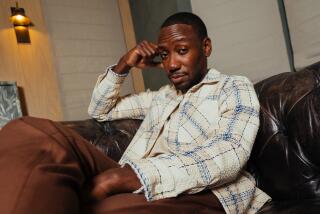Pain comes with the joy for U.S. Olympic cyclist Tyler Farrar
- Share via
Tyler Farrar, a 27-year-old road cyclist from rural Wenatchee, Wash., learned young that he wasn’t any good at baseball or basketball. Football didn’t work out. Hockey? Not so much.
Yet when Farrar got on a bicycle, he was special. In fact, some think he’s the only U.S. man with a chance to medal at the London Olympics.
But with all the promise has come pain and heartbreak. It makes you wonder why he still loves the sport.
In 2008, his father, Ed, his biggest supporter, and a prominent surgeon in Wenatchee, was cycling to work on windy roads when he was hit by a car and left paralyzed. Farrar speaks in sentences of only three or four words about that accident and asks interviewers not to contact his father.
And in 2011, Wouter Weylandt — one of Farrar’s best friends in the peloton, that massive group of cyclists that race elbow-to-elbow and follow each other all over Europe in races big and small — became the first cyclist in six years to be killed during a race. Weylandt crashed on a tricky descent during the Giro d’Italia.
There is a wrenching photo of Farrar grieving at the end of the stage after Weylandt’s death. For a few weeks, Farrar stopped training but regained his passion for the bike in time for the Tour de France, where he won a stage. As he crossed the finish line, Farrar formed his hands into a W to honor his deceased friend.
Farrar’s voice changes from upbeat to monotone when asked how it is that he still loves a sport that has brought him so much pain.
“It’s hard dealing with tragedies,” said Farrar, whose recent participation in the Giro d’Italia was abruptly ended by a crash in which he slashed an artery in his wrist. “Yes, cycling has taken things from me, but it’s also given me a lot, a life I wouldn’t have had any other way.
“I’m making a living doing what I love, and I have to keep in mind that you take the bad with the good. There have been hard moments, but that’s life. For example, my dad, yes, it happened on a bike. But my father’s accident, he could have been walking down the road. At a certain point, it’s random bad luck.”
One constant in Farrar’s life since his sophomore year in high school is his girlfriend Stephanie Wade. She lives with Farrar in Washington and Ghent, Belgium. She loves traveling the world and gives insights into Farrar that the reticent cyclist doesn’t.
For example, Wade said Farrar is a genius with language and with pretty much everything else.
She said he speaks English, French, Dutch, German and Italian pretty fluently and can get by in Russian. “Guys in the peloton just assume he speaks their language fluently after he says a few words even if he doesn’t,” she said. “He’s that good with accents. That makes him really popular.”
Wade said Farrar would sit in on some of her classes at Western Washington University and remember word for word what was taught without taking a note. “Really, he could have taken my exams for me,” she said.
Farrar was about 12 when he realized a bike could be used for racing and not just getting from point A to point B. After that, not much else mattered.
Farrar made his professional debut in 2003, and his career has mostly been on the ascent since. His breakout year was 2008, when he had 11 stage wins. A year later, he had won multiple Grand Tour stages at the Giro d’Italia and Vuelta a Espana, and then he got his Tour de France stage win.
“Tyler’s a very steady professional,” said Jon Vaughters, his coach on his professional team, Garmin-Barracuda. “He is the hardest-working sprinter.”
England’s Mark Cavendish is considered the best sprinter in the world, but Vaughters said Farrar has an advantage: “He never gives up. He’s professional and focused in his training, and so the improvements you see aren’t off the back of natural talents. His improvements are the culmination of hard work.”
Vaughters says the Olympic one-day road course is suited to Farrar, with just enough hills but not too many, to reward Farrar’s steadiness on the bike. “The U.S. has a lot of great racers for stage races: Christian Vande Velde, Tejay Van Garderen,” Vaughters said. “But one for one-day races like the Olympics, Tyler’s the one.”
Being “the one” is directly linked to another word, “obsession.”
“There’s a lot of suffering involved,” Farrar said. “I don’t really have any other strong passions. Cycling was a sport I was good at while I was pretty terrible at all the traditional sports. So cycling was the one I enjoyed because I was always happy to get out on my bike and win.
“It’s an honor for people to be saying I’m an Olympics threat because that’s the dream for any athlete. So if I’m there, that’s a dream come true. Plus, it’s a course that suits me. It’s going to be a sprint finish, but there’s hills to climb. I’m a sprinter, but I can survive.”
Which sounds exactly the way Farrar leads his life. He handles the uphills, and sprints toward the good parts.
twitter.com/mepucin
More to Read
Go beyond the scoreboard
Get the latest on L.A.'s teams in the daily Sports Report newsletter.
You may occasionally receive promotional content from the Los Angeles Times.






